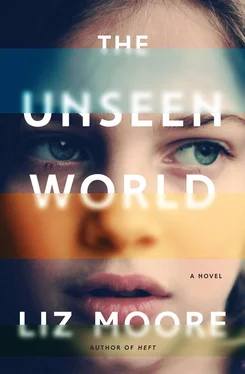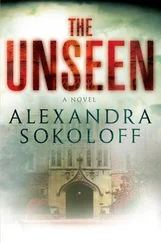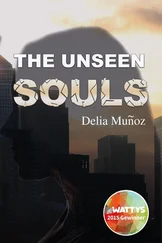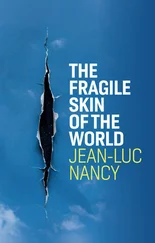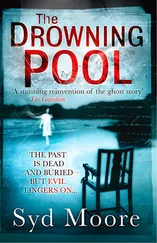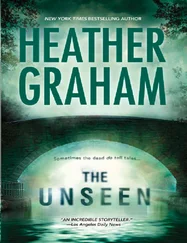The gallerist, not wanting to give him the number directly, called George for him, and then proffered the telephone to David, and then stood to one side, an arm crossed about his torso, waiting.
George answered after six rings.
His voice, for several syllables, sounded rattling, disused. He cleared his throat. “Of course,” he said, when David asked if they could meet.
He was not far away. He no longer liked cafés, he said, so they met instead on a bench that overlooked the Potomac from a park that spanned the waterfront. It was the same one they always used to sit on together, said George by way of instruction, and David had to confess that he could not remember.
“Hang on,” he said, and he wrote down the directions messily on a slip of paper that the gallerist handed him.
When David arrived, George was waiting for him already. From the back, he looked hollow: as changed as the buildings he used to inhabit. His shoulders were sharp. David could see the bones of them through the light shirt he wore.
He paused for a moment, and George turned around. His face made it plainer. It was a skeleton’s face: it was painful to look at.
“I’ve got it,” said George, waving a languid hand before his body, as if to indicate, all of it .
It was then being called GRID , but George didn’t use the term. It , he said, and David understood.
They sat together for an hour. There was no use in explaining to George the favor for which he had sought him out: he would outlive George, David knew, even with the onset of his own disease. Instead, they both fell silent.
One memory, intact, occurred to David: It was of seeing George, for the first time, in the Mayflower Hotel, his hat rakishly askew, his clothing dark and warm-looking. He had looked strong; he had looked fearless. David, then, had imagined touching him. He touched him now: put an arm around George’s shoulders, felt the bones in them loosen slightly, felt the insubstantial weight of him shift almost imperceptibly toward David.
I’m sick, too , David could say, but what use would that be? It was different. He closed his eyes. The sun was going down; he could sense it through the skin of his eyelids, the gathering dusk, a familiar dimming of the sky.
He would count on Pearse, then, and ELIXIR, to deliver his story. He would count on the hope that he had taught his daughter well enough for her to one day solve the puzzle he had laid before her: an offering.
David returned to Boston on an overnight train. He had reserved a bed in a sleeper car, remembering his fascination with the idea of them as a boy; but he found he was too tall for them now, and he slept first fitfully, and then not at all.
He returned to the house in the morning and found that Ada wasn’t home.
He would wait, he thought; he would make her a nice lunch later. He was looking forward to seeing her. His daughter. His best and most valuable creation.
When Ada emerged from Frank’s office, it was 5:00 in the evening and dark outside already. She had read for seven hours straight. She had gone back over several passages twice. She had not eaten since breakfast. At first she could not find Gregory and Frank; she wondered if they’d left. But finally she wandered around a corner and found them sitting on chairs in a sort of slapdash waiting room.
Frank was laughing, nearly shouting, at what seemed to be Gregory’s recitation of some shared memory. How nice it was, thought Ada, to be in the presence of people who knew her father and Liston.
“I’d imagine,” began Gregory, and then he saw her, and paused.
“I’m finished,” said Ada.
She felt pale and unsteady.
They stared at her for a moment. Then Frank rose to his feet, brushing off the legs of his pants. “Right!” he said. “Is there anything else you need?”
They did not ask anything further of her. It was not their story to ask for.
As they were leaving, Frank put both of his hands on her shoulders and looked into her eyes. His face looked like family. In his embrace, for the first time in years, she felt young, childlike. She felt he could see into her past. He had known her since she was small: there were only a handful of people in the world who could say that.
“David was a good person,” he said. “We all knew that.”
Together, in silence, she and Gregory walked back to where he had parked. Their breath came out before them in long clouds. A cold frozen rain had begun.
“I’ll bring you to your hotel,” Gregory said, and he said nothing after that.
They pulled onto Mass Ave. The windshield wipers beat slowly. Gregory had his hands on the wheel at ten and two. He looked tense, expectant. She kept her head straight forward, but in her peripheral vision she could see him glance at her every so often.
She wondered what his life was like now: alone in Liston’s old house without Kathryn. She would share David’s story with him later — she owed it to him — but for the moment it was too large, too recent. There were too many more questions to ask.
Who is Harold? she had asked ELIXIR, and a document had presented itself to her containing transcript after transcript, the first dated June 20, 1983.
Nearly eighty thousand words. It was David, in conversation with ELIXIR. It was Harold Canady. It was the story of his life.
Suddenly Ada had the urge to see Shawmut Way again, one last time, before Gregory left.
“Do you mind?” she asked.
“Not at all,” Gregory said, looking straight ahead.
An alarming amount about the street had changed, even in the last five years. One of the more decrepit Victorians, and one of the nicest, had been knocked down and replaced by modern houses with modern conveniences that looked anachronistic to Ada: Driveways paved in stone. Energy-efficient windows that looked somehow as if they lacked both age and wisdom. Low shrubs in place of a beautiful old oak that had been the best climbing tree in Savin Hill. One front lawn had been replaced by a rock garden.
It was January 8, and most of the houses still had their holiday decorations up. Shawmut Way had always looked beautiful at Christmas, when Ada was a child; and David and Liston had always led the charge in decorating it. Both had preferred fat old-fashioned Christmas lights in bright colors, the tacky ones that most of the other residents of Shawmut Way had traded in over the years for small and classy white ones. Now both houses were dark.
Gregory pulled into Liston’s driveway — his driveway, Ada reminded herself; and Kathryn’s driveway, soon — and they both got out.
“I’ll be right back,” said Ada, and she walked four houses down and stood for a while in front of David’s house. Joanie had updated her on its most recent sale. These days it belonged to a family called the Johnson-Akimoyes, both parents doctors at MGH. They had two children, probably teenagers by then. The curtains on the windows at the front were open, and Ada stood for a while, looking into the lit house, considering how long ago it was that she and David had lived inside that house together. She was reminded, suddenly, of their annual pilgrimage to Gramercy Park: the two of them straining to see inside the windows of the house that had never been David’s. He had been pretending, then, to look into his past, when really he was looking into some alternate reality, some different version of his own history, some unseen world.
A quick motion at the living room window, a face. The Christmas lights outside went on, and then the curtain dropped. Perhaps she had been noticed.
Liston’s house was the only undecorated one on the block.
“Never got around to it,” said Gregory, forlornly. He’d let himself in already, was turning lights on here and there. He’d left the door unlocked behind him for Ada.
Читать дальше
